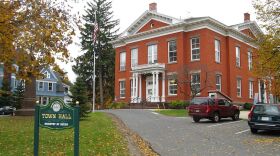An attempt to end years of complaints and litigation around a controversial trucking business in Great Barrington, Massachusetts failed at Monday night’s special town meeting.
The attempted repeal of Great Barrington’s plastic water bottle ban wasn’t the only motion that failed to convince voters. Town leaders presented a plan to offer finality to both residents aggrieved over the business that they say is disrupting their quality of life on a regular basis and Great Barrington’s ongoing attempts to enforce zoning bylaws that O’Brien Trucking is challenging in court.
Selectboard chair Stephen Bannon presented the warrant item “that the town authorize the selectboard to acquire a property that is known and referred to as 11 Roger Road, Great Barrington, Mass. The property — together with all existing buildings and structures at the property, upon such terms and conditions as the selectboard shall determine are appropriate, and with the selectboard to have custody of the property for the purpose of sale and conveyance."
The selectboard was asking that $298,000 be used from a special real estate fund for the purchase — and also that the town give it a broad mandate in how they would use the property.
“And to authorize the selectboard to take any action and to execute any documents in connection with such acquisition," read Bannon at the meeting.
David Doneski is an attorney with KP Law, which says it represents 125 municipal clients across Massachusetts, including Great Barrington. He said the nature of the legal dispute over the business had no end in sight.
“Litigation typically in the land court, where this case has been filed, would take at least a year to get to a point of resolution, and in my experience, would likely take a substantial amount of time longer than that," Doneski told voters. "That leads into the second point, which is the cost. The longer you’re in litigation, the higher the cost.”
The selectboard was arguing that the almost $300,000 cost of the land would save the town a projected $100,000 in legal fees — as well as provide a definitive ending to the long-running dispute, as opposed to a possibly open-ended legal settlement.
Jonathan Hankin, of the town’s planning board, had the first turn at the mic.
“Who’s going to pay for the environmental review and how much is that going to cost?” he asked town leaders.
Doneski said the town would shoulder the costs of the review to ensure that the land was not poisoned — to the tune of at least $5,000.
Andrew Blechman, a former selectboard member, had another clarifying question.
“Can the town resell this property so we can just get our money back?” he asked.
“The next motion is to give the selectboard the right to convey the property so yes, we could sell the property," Bannon responded. "We are not promising that we’re going to make a profit on this or even break even, but because of future litigation costs, we think this is the best way to deal with it.”
But it was not to be. Criticism of the plan mounted from voters, including John Grogan of Housatonic.
“Once we open this Pandora’s box, what is to stop anybody who doesn’t like a zoning regulation from digging their heels in and saying screw you, I’m not going to pay the fines until you buy my property,” he asked.
Bannon attempted to argue claims that the town was “placating” the O’Briens.
“I’ve learned zoning regulations are not easily enforceable and always appealable to the courts and continue to cost us huge amounts of legal fees. So although it would seem black and white — and I wish it was — it’s not that easy,” he told Grogan.
Jan Wojcik has lived near O’Brien Trucking for six years, and says that over that time, the situation has gotten worse and worse.
“Currently I am one of the neighbors who has a dozen or more triple axel dump trucks rumbling by starting at 4 in the morning, shaking the house and making my property very difficult to sell, to say the least,” Wojcik said at the meeting.
He said the property purchase was a “distasteful” but mandatory solution for a dispute that Bannon confirmed first entered the courts in 1996. He said the neighborhood was willing to stand together in demanding the town enforce its zoning bylaws on Gary O’Brien, who co-owns the business with his wife Kristin.
“As people realize that the business is getting larger and larger, it becomes onerous enough that most of us are willing to put some money up front to start litigation," said Wojcik. "And it won’t be against Gary — it’ll be against the town itself.”
Voter Karen Smith excoriated town leadership for failing to act sooner, and said that the solution was inadequate to holding Gary O’Brien accountable.
“He has not obeyed the law, not paid a fine, not done anything, and now he gets $298,000 when the asking price was $255,000. I have a difficult time accepting that,” said Smith.
Neither O’Brien spoke at the meeting, though Kristin had previously told WAMC that she believed their business was operating legally and that they would accept the town’s plan if passed. Ultimately, voters were not convinced. The motion failed to meet the two-thirds vote required to move forward with the purchase, bringing the convoluted situation back to square one.







